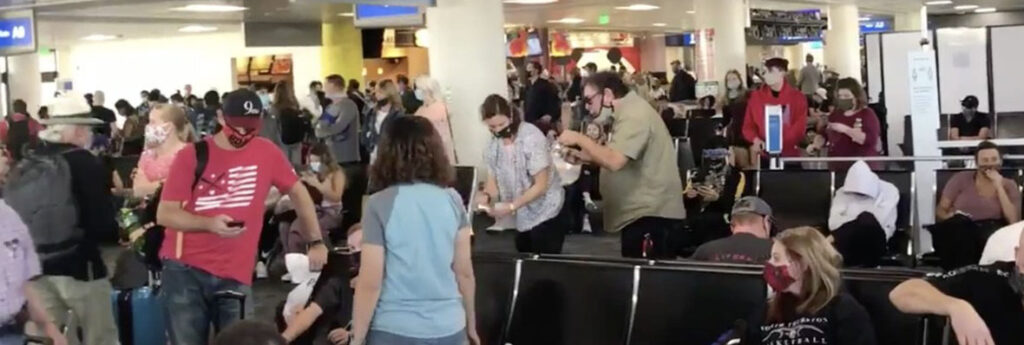With Covid 19 cases soaring to record levels in nearly every state across the US, Dr. Anthony Fauci, the top infectious disease specialist in the country, along with other health experts were on the Sunday morning news shows delivering a clear message to Americans. Stay home this Thanksgiving holiday. Do not travel. Do not attend large family gatherings. The risk of infection is high. The response was a significant rise in travellers at US airports.
The fact is, millions of Americans bought tickets to fly somewhere for Thanksgiving before the nation’s top public health agency pleaded with them not to travel for the holiday.
So, what are they doing now? In many cases, they’re still crowding airports and boarding planes. That’s despite relatively lenient cancellation policies that major airlines have implemented since the coronavirus pandemic emerged earlier this year.
“Consumers should feel comfortable changing their plans and cancelling their flights if they need to for health reasons,” said John Breyault of the National Consumers League.
Most airlines won’t pay cash to refund a flight if you decide to heed national health warnings but they are waiving fees and offering vouchers. Breyault said to “familiarize yourself with the policies” because the voucher specifics vary by airline and can depend on when the ticket was booked.
It’s not clear how many people are taking those vouchers. Images that emerged this weekend of crowded airport terminals showed that plenty of people are flying anyway.
More than two million people were screened at US airports on Friday and Saturday, according to the Transportation Security Administration. While that’s far lower than during the same time last year, Friday was only the second time since mid-March that daily airport screenings topped one million.
A day earlier, the Centers for Disease Control and Prevention said Americans should skip Thanksgiving travel and not spend the holiday with people from outside their household. Fauci, said Sunday he’s worried that instances of crowding at US airports from Thanksgiving travel could lead to a perilous situation as COVID-19 cases surge.
Fauci told CBS’ “Face the Nation” that people at airports “are going to get us into even more trouble than we’re in right now.” He said that new COVID-19 cases from Thanksgiving won’t become evident until weeks later, making it “very difficult” as the virus spirals out of control heading into colder weather and the December holiday season.
For most people, the new coronavirus causes mild or moderate symptoms, such as fever and cough that clear up in two to three weeks. For some – especially older adults and people with existing health problems – it can cause more severe illness, including pneumonia, and death.
Airlines have emphasized what they’re doing to sanitize gates and kiosks, shorten lines and gatherings and purify the air. But most are also offering opportunities for people to skip their holiday flights and travel later, though travellers might have to pay more for the replacement flight if it’s more expensive.
For those still travelling, the TSA said it had prepared for higher traffic this week, increasing staff levels to keep lines shorter and maintain social distancing.
“We have been handling passenger volumes reaching more than 900,000 a day frequently since early October,” the agency said in an emailed statement Sunday.
“Please seriously consider decisions that you make,” Fauci said, noting that although airlines have invested in air circulation and ventilation systems to minimize viral transmission, “sometimes when you get a crowded plane, or you’re in a crowded airport, you’re lining up, not everybody’s wearing masks — that puts yourself at risk.”
And indoor gatherings, he warned, are risky. “When you’re eating and drinking, obviously, you have to take your mask off,” he said. “We know now that those are the kinds of situations that are leading to outbreaks.”
Fauci stressed that vaccines should become available in the coming months, but said Americans will need to “hang in there” in the meantime by taking precautions to stem the spread. That includes limiting holiday gatherings to people in the same household if possible, wearing masks, socially distancing and washing hands.

